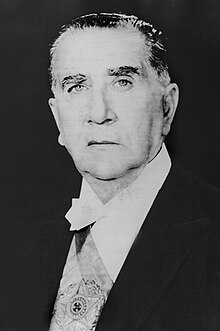Emilio Garrastazu Médici
|
General Emílio Garrastazu Médici |
|
|---|---|
 |
|
| 28th President of Brazil | |
|
In office October 30, 1969 – March 15, 1974 |
|
| Vice President | Augusto Rademaker |
| Preceded by | Military Junta of 1969 |
| Succeeded by | Ernesto Geisel |
| Head of the National Intelligence Service | |
|
In office March 15, 1967 – April 14, 1969 |
|
| President | Artur da Costa e Silva |
| Preceded by | Golbery do Couto e Silva |
| Succeeded by | Carlos Alberto da Fontoura |
| Personal details | |
| Born |
December 4, 1905 Bagé, Rio Grande do Sul, Brazil |
| Died | October 9, 1985 (aged 79) Rio de Janeiro, Rio de Janeiro, Brazil |
| Resting place | São João Batista Cemetery, Rio de Janeiro, Brazil |
| Nationality | Brazilian |
| Political party | National Renewal Alliance Party – ARENA |
| Spouse(s) | Scila Nogueira |
| Children | Sérgio Roberto |
| Profession | Military |
| Military service | |
| Allegiance |
|
| Service/branch |
|
| Years of service | 1927–1969 |
| Rank | Army General |
| Commands |
|
Emílio Garrastazu Médici, (Portuguese pronunciation: [eˈmilju ɡɐʁastaˈzu ˈmɛd(ʒi)si]; December 4, 1905 – October 9, 1985) was a Brazilian military leader and politician who was President of Brazil from 1969 to 1974. His authoritarian rule marked the apex of the Brazilian military government.
Médici was born in Bagé, Rio Grande do Sul state. From his father's side, he was the grandson of Italian immigrants who went to Uruguay and then moved to Brazil. On his mother's side he descended from Basques. In the 1920s he entered military school at Porto Alegre and then the Army where he was steadily promoted, becoming general in 1961.
During 1950s, he served as a commander of reserve forces before being appointed chief of staff to Artur da Costa e Silva from 1957 to 1960. After the military coup Médici became Brazil's military attache to the USA from 1964-1966. In 1967 Médici was appointed chief of the National Intelligence Service of Brazil.
In 1969 he became commander of the Third Army and was chosen to become President of Brazil by the Brazilian Military Junta of 1969, succeeding Costa e Silva, who had suffered a stroke. As the President was elected by National Congress, it had to be re-convened for this purpose after being dismissed by Costa de Silva. The legislature, dominated by the pro-military National Renewal Alliance Party (ARENA), elected him by a margin of 313-0, with 56 abstentions. Médici took the oath on October 30, 1969 and served until the end of his term on March 15, 1974.
Médici's tenure was arguably the most repressive of Brazil's military regimes. He ruled under a 1967 Constitution which had been amended a few months earlier to be even more repressive than its predecessor. His regime made liberal use of torture and strict press censorship. Import of the men's magazines Playboy, Penthouse and Lui, as well as the West German news magazine Der Spiegel, was banned because they offended "morality and proper behavior".
...
Wikipedia
